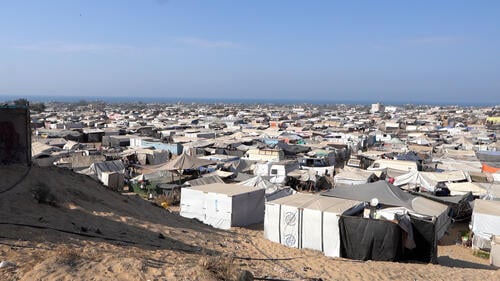Jerusalem – As humanitarian aid entering Gaza, Palestine, reaches its lowest level in months, Médecins Sans Frontières (MSF) warns that patient care is critically compromised while medical conditions linked to shortages of food, water, and shelter materials are expected to surge with the onset of winter.
“Shortages of critical supplies have reached such levels that we are now forced to turn away patients in some facilities,” says Caroline Seguin, MSF's emergency coordinator in Gaza. “Restrictions and obstacles to the entry of aid by the Israeli authorities continue to severely hamper our ability to provide care. Meanwhile, the looting of aid trucks within the enclave is making it difficult for that small amount of aid allowed by Israeli authorities to reach those in need. Ultimately, it's the patients who suffer the consequences.”
According to the United Nations, October 2024 marked the worst month for humanitarian aid entering Gaza since the conflict began, and November doesn't look much better. The number of trucks entering Gaza has decreased fourfold since July 2024. This is equivalent to 40 humanitarian trucks entering per day, compared to the 500 trucks entering per day prior to 7 October 2023.
Lack of medicine and basic bandages
The facilities where MSF provides essential care are not immune to these shortages.
“Our patients are increasingly vulnerable to serious infections,” says Seguin. “In the burn units we support in the Nasser hospital, Khan Younis, even basic wound care supplies like gauze and bandages are running out. This forces our teams to extend the intervals between dressing changes, increasing the risk of infections for patients who desperately need proper care.”
In the burn units we support in the Nasser hospital, Khan Younis, even basic wound care supplies like gauze and bandages are running out.Caroline Seguin, MSF's emergency coordinator in Gaza
In Deir al-Balah, central Gaza, the field hospital set up by MSF to run outpatient activities and paediatric hospitalisation is now running low on antibiotics and painkillers for children. This shortage is hampering treatment for conditions such as low respiratory infections and is also preventing adequate pain management for young patients. Medications for hypertension, a common but potentially deadly condition if left untreated, are also lacking now, leaving many patients untreated and at risk of acute complications, including cerebrovascular accident.
At Nasser hospital in southern Gaza, MSF teams are unable to set up a much-needed clinical bacteriology laboratory - a key piece of equipment for diagnosis and administering the right antibiotics - because the cold chain needed to operate it is constantly opened and damaged by Israeli officers at the crossing point.
Beyond medicines and medical equipment, MSF teams are also facing increasing challenges in the provision of sufficient food to hospitalised patients, as there is a dire scarcity of food supplies throughout the Strip. Several bakeries have closed while others are struggling to remain open due to the lack of flour and fuel. MSF teams have now begun to conduct systematic nutritional screenings for children in our clinic in Gaza City and at our field hospitals as malnutrition is a growing concern.
Increasing the provision of water and sanitation services is another rising challenge for MSF as our teams are yet to receive authorisation from Israeli authorities to import desalination units or generators.
Quite simply, this means that there is not enough clean drinking water for people.Caroline Seguin, MSF's emergency coordinator in Gaza
“Quite simply, this means that there is not enough clean drinking water for people,” says Seguin. “The only alternative to desalination units is water trucking, which MSF does, but this is extremely expensive, especially due to the cost of fuel, which is also strictly rationed by Israel. Last week, our team had to cut water trucking activities in half because of this problem.”
A massive and secure flow of aid is imperative
The severe deterioration of the situation in Gaza is a direct result of Israel's extensive restrictions and obstruction of aid over the past year, which remain the primary barrier to the delivery of essential supplies. These restrictions have created an environment of desperation and instability, contributing to a rise in looting and criminality that further hampers aid efforts. In recent weeks, several trucks, including those carrying MSF supplies, have been attacked and stripped of their goods. Meanwhile, other supplies cleared for entry remain stuck at the border, waiting for conditions to become safe enough to proceed.
“Every minute that lifesaving medicines or supplies such as hygiene kits, plastic sheeting for tents, and life-saving drugs are delayed or denied by the Israeli authorities, or when items are not delivered to those in need due to looting, our patients are the ones who suffer the consequences,” says Seguin.
For months, people in Gaza have been trying to survive despite massive shortages of basic goods such as flour, soap, and eggs. Winter, cold, hunger, heavy rains and flooding are increasing medical needs, and MSF teams are concerned that this could push people over the edge.
“Humanitarian organisations have been warning for months that the woefully inadequate supply of aid would worsen the already dire situation in Gaza. We have now reached a tipping point,” continues Seguin. “A massive and secure flow of aid is imperative to begin meeting the needs of people in Gaza who otherwise will face deadly consequences in the coming winter months. In addition to that, an immediate and sustained ceasefire throughout Gaza is needed to prevent further death, suffering, and societal collapse.”



